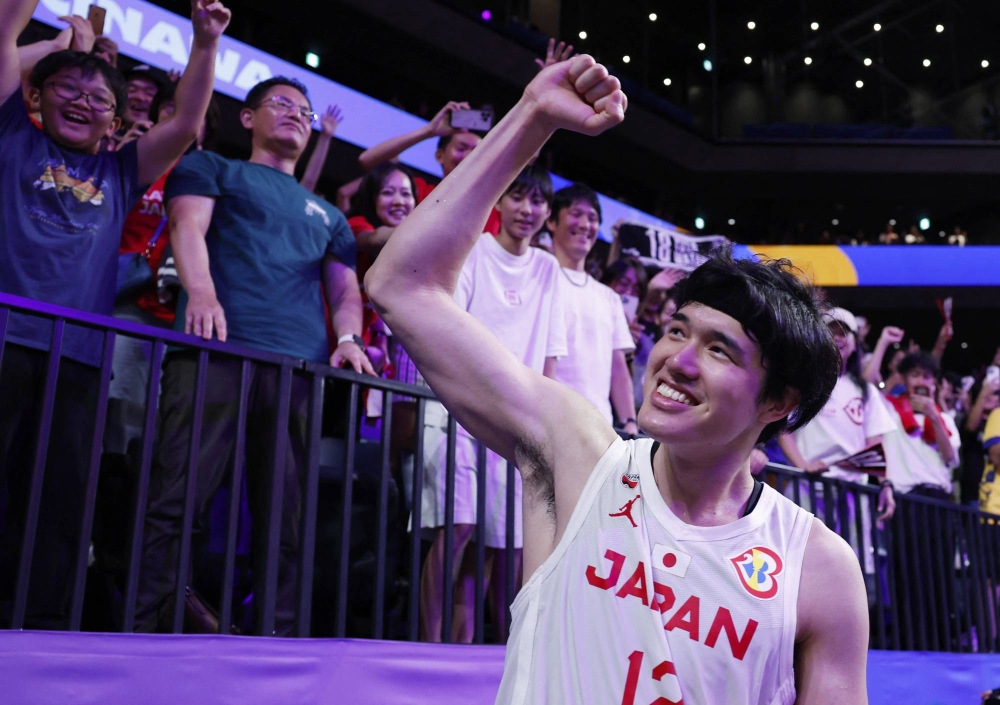2023 marked a big turning point for Japan’s previously floundering men’s national volleyball, basketball and handball teams, which all ended decades of underachievement by executing long-term plans.
Excluding its host-nation qualification for the Tokyo Olympics in 2021, Japan will send men’s teams for all three sports to the same Olympics next summer in Paris for the first time since the 1976 Montreal Games.
Japan reached the podium in a major international volleyball tournament for the first time in 46 years in July by beating world champion Italy for a bronze in the Nations League, previously called the World League, before clinching its Olympic berth in October.
The Japan Volleyball Association reaped the dividends of a 2013 policy shift, when it began emphasizing more playing time for young athletes with the Tokyo Games in mind.
“We needed players who would be at their peak seven years later, so we made wholesale changes to our team selections,” said Masashi Nanbu, Japan manager from 2014-16.
Current ace Yuki Ishikawa made his senior national debut while still in university, as did mainstays Akihiro Yamauchi and Taishi Onodera. Ran Takahashi played at the Olympics as a university student under Yuichi Nakagaichi, who took the reins until the Tokyo Games, as the trend to nurture youth continued.
“It was huge for the players to be put in an environment where they were competing against the world’s top-level teams from a young age,” Nanbu said.
Japan secured direct Olympic qualification in basketball in September when it co-hosted the 2023 FIBA World Cup. The achievement also followed drastic administrative changes, albeit ones forced by external pressure.
Governing body FIBA had banned Japan from men’s and women’s international competition in 2014 after the Japan Basketball Association failed to meet an ultimatum to merge the country’s two feuding men’s leagues, one fully professional and the other involving corporate teams.
FIBA at the time was believed to be concerned by the performance of the Olympic host Japan, which finished a record-low 10th at the 2009 Asian Championship. The 2016 launch of the domestic B. League led to bigger crowds and enabled higher payrolls and a more professional environment for players.
The heroics of homegrown players such as Makoto Hiejima and Yuki Kawamura in Okinawa were a testament to the improved quality of the domestic league. Japan claimed three wins, including one over Finland for its first World Cup victory since 2006, to qualify for the Olympics as a nonhost for the first time in 48 years.
Reflecting on FIBA’s tough stance, Japan Basketball Association’s head of development Tomoya Higashino said it had been a case of tough love.
“It was a penalty with the Tokyo Olympics in mind,” Higashino said. “The B. League raised the level of the national team.”
The integration of overseas-based stars with domestic-based players drove Japan to its first Olympic handball berth in 36 years under manager Dagur Sigurdsson, who has had steadfast backing from the national association since taking charge in 2017.
Kosuke Yasuhira, currently plying his trade at RK Vardar in Macedonia, was one of the five foreign-based players who helped Japan win the Asian Olympic qualifiers in October with a perfect 6-0 record culminating in a 32-29 final triumph over Bahrain.
New Japan Handball Association President Yasufumi Kanemaru has been strategizing how to further elevate the national team. Among the first initiatives was a summer tour by European giant Paris Saint-Germain, which beat Zeekstar Tokyo 36-27 and Japan 39-24 in a pair of friendlies.
“I wanted to awaken Japanese handball, which has been slumbering,” said Kanemaru. “It’d be great if players can head abroad while they are in high school. We’ll create opportunities that would enable them to take on challenges early in their careers.”

